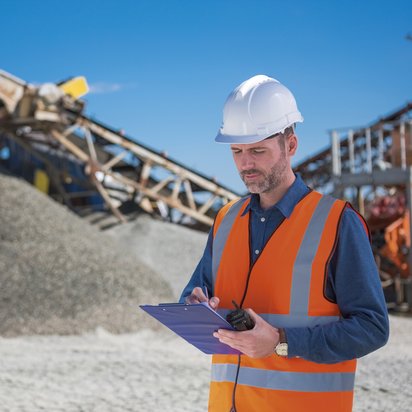Ersatzbaustoffverordnung fördert Verwertung mineralischer Massenabfälle
Erste bundesweit einheitliche Verordnung tritt am 1. August 2023 in Kraft

Erste bundesweit einheitliche Verordnung tritt am 1. August 2023 in Kraft

The most important waste group in Germany in terms of volume is construction waste, such as excavated soil or building rubble. Large quantities of this mineral waste are generated, for example, during construction and demolition measures, road construction, railway construction or industrial processes; at the same time, large quantities of raw materials are required in technical structures. The ‘Ordinance on Requirements for the Installation of Mineral Substitute Building Materials in Technical Structures’, or ‘Substitute Building Materials Ordinance’ (EBV) for short, which will come into force on 1 August 2023, now regulates for the first time nationwide how waste can be recycled and reused in a resource-saving manner in line with the circular economy.
Until now, the recycling of mineral bulk waste was not regulated in a standardised manner. Now there is a standardised national regulation in the form of the Substitute Building Materials Ordinance (EBV). This has three main advantages, explains Rolf Vieten, expert at TÜV NORD EnSys and lecturer at TÜV NORD Akademie: ‘Firstly, the acceptance of substitute building materials is to be increased, firstly by ensuring the quality of the substitute building materials through quality monitoring and, secondly, by replacing the difficult to understand coexistence of different regulations at state level with legally secure, nationally valid specifications. Secondly, the use of substitute building materials is intended to conserve primary raw materials and make construction projects more economical. And thirdly, the protection of people and the environment is ensured, as the EBV clearly defines which substitute building materials are suitable for which construction projects and which material values must be adhered to.’
Relevant for manufacturers and users
The regulation is important for companies that produce substitute building materials, such as waste disposal companies or processing plants. It is equally relevant for companies that use such recycled building materials, for example civil engineering, road construction and railway construction companies. In addition, engineering or planning offices, environmental laboratories or waste authorities must also apply the new Substitute Building Materials Ordinance, as it will be mandatory from 1 August - ‘even for many construction projects that are already being planned,’ says Rolf Vieten. ‘Extended transition periods only apply in a few cases.’
Companies in the relevant sectors should therefore familiarise themselves thoroughly with the new Substitute Building Materials Ordinance, the expert recommends, because: ‘The EBV does not necessarily make the production and use of substitute building materials any more complicated. But it does require affected companies and authorities to make a change.’ Unfortunately, there is still little concrete help available for practical implementation. Rolf Vieten advises companies to get in touch with the relevant authorities and potential suppliers at an early stage, for example in the run-up to a major construction project, in order to agree how the requirements of the regulation can be complied with.
New substance groups, material values and analysis methods
What are the specific changes? The Substitute Substances Ordinance introduces new substance classes and sets out very specific requirements, for example on the possible use of certain substitute building materials in technical structures depending on the groundwater cover layer or the analysis methods used. The EBV provides numerous tables with detailed values for this purpose. Other changes relate to sampling, laboratory analyses and the staggered monitoring of quality control.
Details on the most important changes, the categorisation of structures and a more detailed breakdown of the companies affected can be found in the TÜV NORD Akademie knowledge blog:
https://www.tuev-nord.de/de/unternehmen/bildung/wissen-kompakt/ersatzbaustoffverordnung/
Together with Rolf Vieten, TÜV NORD Akademie is offering a seminar on the introduction to the Substitute Building Materials Ordinance. It will be offered from the end of July in Hamburg, Hanover, Essen, Berlin and other cities as well as in the OnlineCampus. https://www.tuev-nord.de/de/weiterbildung/seminare/seminar-einstieg-in-die-ersatzbaustoffverordnung-ebv-a/
Founded over 150 years ago, we stand for security and trust worldwide. As a knowledge company, we have our sights firmly set on the digital future. Whether engineers, IT security experts or specialists for the mobility of the future: in more than 100 countries, we ensure that our customers become even more successful in the networked world.